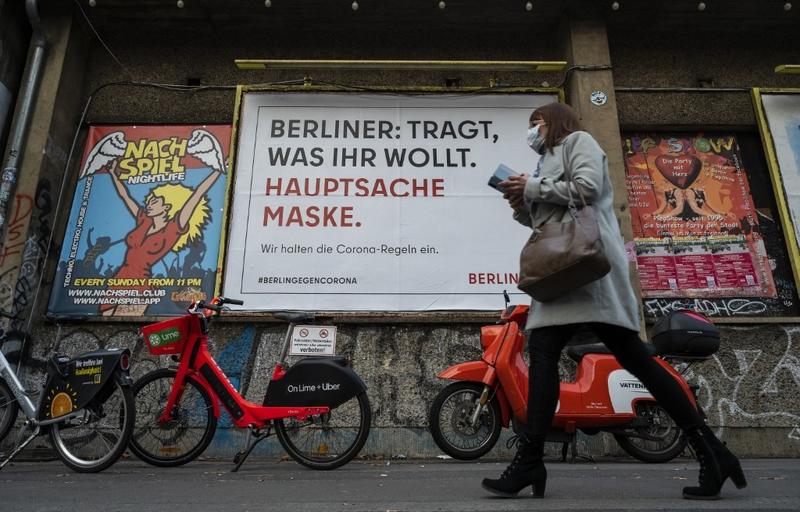 A woman wearing a face mask walks past an advertising billboard reading: "Berliners, wear whatever you want, as long as you wear a mask" amid the COVID-19 pandemic in Berlin on December 2, 2020. (JOHN MACDOUGALL / AFP)
A woman wearing a face mask walks past an advertising billboard reading: "Berliners, wear whatever you want, as long as you wear a mask" amid the COVID-19 pandemic in Berlin on December 2, 2020. (JOHN MACDOUGALL / AFP)
MOSCOW / BUENOS AIRES / WASHINGTON / MEXICO CITY / SAO PAULO / QUITO / TUNIS / TIRANA / WARSAW - The World Health Organization (WHO) does not recommend countries issuing “immunity passports” for those who have recovered from COVID-19, but is looking at prospects of deploying e-vaccination certificates like those it is developing with Estonia.
Estonia and the United Nations health agency in October started a pilot project for a digital vaccine certificate - a “smart yellow card” - for eventual use in interoperable healthcare data tracking and to strengthen the WHO-backed COVAX initiative to boost vaccinations in developing countries.
The promise of COVID-19 vaccines is “phenomenal” and “potentially game-changing”, WHO European director Hans Kluge said on Thursday, a day after Britain became the first Western country to approve a shot
“We are looking very closely into the use of technology in this COVID-19 response, one of them how we can work with member states toward an e-vaccination certificate,” said Siddhartha Datta, Europe’s WHO program manager for vaccine-preventable diseases, told reporters on a call from Copenhagen.
The reality of vaccinations is growing, since Britain on Wednesday approved a COVID-19 shot from Pfizer and Germany’s BioNTech, while other companies Moderna and AstraZeneca have delivered positive trial data amid their push for approval.
The promise of COVID-19 vaccines is “phenomenal” and “potentially game-changing”, WHO European director Hans Kluge said on Thursday, a day after Britain became the first Western country to approve a shot.
Speaking from Copenhagen, Kluge said vaccine supplies would be very limited at first and that countries must decide who gets priority, though the WHO also cited “growing consensus” that first recipients should be older people, medical workers and people with other diseases, as Britain plans.
The organization also plans to develop a dashboard that will measure the uptake of COVID-19 vaccinations, according to Siddhartha Datta, program manager for vaccine-preventable diseases and immunization.
That’s critical both for planning purposes in various countries and for any mid-campaign changes to vaccination strategies, he said.
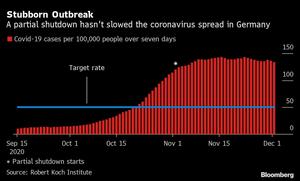 Africa
Africa
Africa aims to have 60 percent of its population vaccinated against COVID-19 within the next two to three years, the African Union’s disease control group said on Thursday.
The continent of 1.3 billion people has recorded more than 2.2 million confirmed coronavirus infections, according to a Reuters tally.
Albania
The restrictions taken by the Albanian authorities to limit the spread of COVID-19 infections will remain in force for an indefinite period of time, the Technical Committee of Experts on the coronavirus situation in Albania announced in a press conference on Wednesday.
Deputy Minister of Health and head of the Technical Committee of Experts Mira Rakacolli told reporters that curfew hours and restrictive measures will continue to be in force for an unlimited period of time in an effort to contain the virus spread.
"The measures we imposed seem to slow the virus transmission and therefore we have decided that the measures will remain in force for an unlimited period of time. Restaurants and bars will continue to stop their activities at 10 pm," Rakacolli said.
On Nov 9, Albanian authorities decided to restrict movement from 10 pm to 6 am local time for three weeks and ordered closure of all bars and restaurants during the hours in the period in an effort to curb the spread of the virus.
On Wednesday, health authorities reported 705 new coronavirus cases and 17 COVID-19 related-deaths in the last 24 hours, bringing the total confirmed cases in the country to 39,719, with 19,912 recoveries and 839 fatalities.
Argentina
Some 60,145 healthcare workers in Argentina contracted COVID-19, and 362 of them died as a result, the Health Ministry's Secretary of Access to Health Carla Vizzotti said on Wednesday.
On Thursday, Dec 3, Argentina celebrates Day of the Doctor and this commemoration will be "a very special day, a very special year," Vizzotti said at a press conference.
"The message that we want to give from the ministry is to prioritize healthcare staff, acknowledge the doctors and give recognition to those who have lost their lives in response to this pandemic," she added.
ALSO READ: COVID-19 nasal spray 'ready for use'
The South American country detected its first case of COVID-19 on March 3, and reported a total of 1,432,570 cases and 38,928 deaths from the disease as of Tuesday.
Belgium
Belgian health-care workers and care-home residents will be the first to receive a COVID -19 vaccine, followed by people aged 65 and above. People aged 45 to 65 with an underlying medical condition are next in line, ahead of Belgians with a still-to-be-defined “essential” social or economic function. Belgium expects to receive about 600,000 vaccine doses in the first months of 2021, according to Pedro Facon, the official in charge of coordinating Belgium’s pandemic policy.
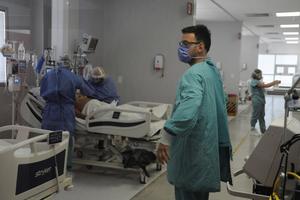 Health workers assist a COVID-19 patient at the intensive care unit of the Central Hospital in Mendoza, Argentina, on November 6, 2020, amid the new coronavirus pandemic. (ANDRES LARROVERE / AFP)
Health workers assist a COVID-19 patient at the intensive care unit of the Central Hospital in Mendoza, Argentina, on November 6, 2020, amid the new coronavirus pandemic. (ANDRES LARROVERE / AFP)
Brazil
Brazil's COVID-19 death toll reached 174,515 on Wednesday, after 698 more patients died in the last 24 hours, the country's health ministry said.
Meanwhile, tests detected 49,863 new infections, bringing the total tally to 6,436,650.
Brazil has the world's second deadliest outbreak, behind only the United States, and the third-highest number of COVID-19 infections.
Sao Paulo, the epicenter of the pandemic in the country, has registered a total of 42,456 deaths and 1,259,704 cases.
Ecuador
Ecuador registered 1,203 new COVID-19 cases in the last 24 hours, taking the national count to 194,876, the Ecuadorian Health Ministry said Wednesday.
Meanwhile, 51 more deaths were reported, bringing the death toll to 9,103, the ministry said.
Quito, the current epicenter of the national outbreak, has so far reported 64,777 cases, including 308 cases in the past day.
Danilo Calderon, manager of the Quito Sur Hospital, one of the capital's largest hospitals for COVID-19 care, told local press Wednesday that "the 43 beds of the ICU (intensive care unit)" and 170 other hospital beds are full.
According to hospital data, up to 140 people with symptoms associated with the virus arrive daily.
Egypt
Egypt confirmed on Wednesday late night 421 new COVID-19 infections, bringing the total cases registered in the country since the outbreak of the pandemic to 116,724, said the Egyptian Health Ministry.
It is the first time in over four months for Egypt's coronavirus daily cases to exceed 400, since the country reported 401 cases on July 30.
Meanwhile, 28 patients died in Egypt from the novel coronavirus in the past 24 hours, raising the death toll in the country to 6,694, while 133 others completely recovered, increasing the total recoveries to 102,949, the ministry's spokesman Khaled Megahed said in a statement.
Total COVID-19 recoveries have currently declined to about 88.2 percent of the total cases registered in the most populous Arab country, after they revolved around 94 percent in the first week of October.
Finland
Finland’s pandemic situation has deteriorated rapidly with the number of infections growing sharply in almost all areas of the country. Finland registered 5,620 new COVID-19 cases in the two-week period through Nov. 29, which is 2,559 more than during the previous fortnight, the Ministry of Social Affairs and Health said on Thursday. Incidence over the same period almost doubled to 101 cases per 100,000 people, from 55 during the prior fortnight.
Hungray
Hungary reported a record 182 covid deaths, with the daily toll having stayed consistently above 150 for almost a week. There were 7,693 coronavirus patients in hospital, including 663 on ventilators, the government said Thursday. Officials have been bracing for a surge into at least early December because of the delayed effect of lockdown restrictions imposed last month.
The nation may see the rate of infections and deaths start to fall this month, Cabinet Minister Gergely Gulyas told reporters.
Italy
The Italian government approved a new restriction plan for the Christmas and New Year holiday season, banning movements between regions from Dec. 21 to Jan. 6. Movements between different towns will also be banned on Dec. 25, Dec. 26 and Jan. 1, according to a statement from the cabinet.
Italy's national COVID-19 vaccination campaign will see the first tranche of 202 million doses to be distributed to some 40 million people in the first quarter of 2021, Health Minister Roberto Speranza stated on Wednesday.
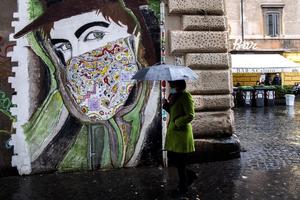 A woman wearing a face mask walks past a mural in Rome's Trastevere district on December 2, 2020 during the COVID-19 pandemic caused by the novel coronavirus. (TINIANA FABI / AFP)
A woman wearing a face mask walks past a mural in Rome's Trastevere district on December 2, 2020 during the COVID-19 pandemic caused by the novel coronavirus. (TINIANA FABI / AFP)
Unveiling the plan before the parliament, Speranza explained that the vaccine would be free and voluntary.
According to the minister, the first doses of the Pfizer vaccine will be delivered to Italy between Jan 23 and Jan 26, and "will be stored in 300 points within public hospitals."
The campaign will start with health care workers and staff, and residents in nursing homes, before moving to vulnerable groups such as the elders -- first the over-80s and then those between 60 and 80 years. The next group will be workers employed in essential sectors, including schools.
The Italian army will be directly involved in the distribution of the vaccine. As of Dec 1, Italy has registered 1,620,901 coronavirus cases, including 779,945 active infections, 784,595 recoveries, and 56,361 fatalities, according to official statistics.
Germany
Chancellor Angela Merkel said Germany will extend its partial lockdown by three more weeks as the country struggles to regain control of the coronavirus spread.
Bars, gyms and cinemas will remain closed until Jan 10 and the government will reconvene with regional leaders on Jan 4 to reassess the restrictions, Merkel said late Wednesday after talks with the premiers of Germany’s 16 states.
Bars, gyms and cinemas will remain closed until Jan 10 and the government will reconvene with regional leaders on Jan 4 to reassess the restrictions, Merkel said late Wednesday after talks with the premiers of Germany’s 16 states
The country’s infection rates are still far too high and need to come down faster, Merkel said in Berlin. “We have to bemoan a very high number of deaths every day, which shows the amount of responsibility that we have.”
Germany had 23,275 new cases in the 24 hours through Thursday morning and total infections have more than doubled since the measures started, according to data from Johns Hopkins University. The latest daily death toll was 482, close to a record.
ALSO READ: Vaccines offer glimmers of hope as world plans for future
Merkel on Wednesday reiterated that the seven-day incidence per 100,000 citizens needs to come down to around 50 -- and stay there -- before restrictions can be loosened. It was at 134 on Wednesday, according to the latest report from Germany’s public health institute.
Restrictions might be tightened further in January if the number of new cases doesn’t come down fast enough, according to Bavarian State Premier Markus Soeder.
“We should not shy away from acting much more consequently,” said the conservative politician, who is seen as a candidate to succeed Merkel as chancellor next year.
The German leader has said before that the country will likely prolong its partial shutdown into January unless there’s an unexpectedly rapid decline in contagion rates. By contrast, France and Britain, which imposed tougher restrictions, are now cautiously moving to loosen curbs ahead of the Christmas holidays.
The lack of progress in stemming the spread is increasing tension over how to protect the economy. Merkel said the government can’t continue to reimburse affected businesses for 75 percent of lost sales next year.
Germany is conducting direct negotiations with domestic COVID-19 vaccine developers to obtain more doses than would be allocated through the shared European Union plan, Health Minister Jens Spahn said on Wednesday.
Greece
Greece extended its lockdown until Dec 14, said Stelios Petsas, a government spokesman. “Certain types of economic activity are simply not going to operate until we have a vaccine,” Greek Prime Minister Kyriakos Mitsotakis said Wednesday. “
Maybe at some point we’ll be able to open restaurants with proper social distancing and we can certainly contemplate opening retail, but certain restriction will be absolutely necessary until we find the vaccine,” he said.
Mexico
Mexico's health ministry on Wednesday reported 11,251 new cases of COVID-19, and 800 additional deaths, bringing the national caseload to 1,133,613 and death toll to 107,565.
The 11,251 new cases over the past day represent one of the biggest one-day increases recorded by the Latin American country since the outbreak of the pandemic.
According to the Mexican government, the real number of infections is likely significantly higher than the confirmed cases.
Mexico now ranks fourth among Latin American countries in terms of documented COVID-19 cases, following Brazil, Argentina and Colombia.
Poland
Polish Prime Minister Mateusz Morawiecki announced on Wednesday that Poland had signed contracts with various developers for the delivery of 45 million vaccine doses. Meanwhile, the country's total number of confirmed COVID-19 cases has topped one million.
Poland's Health Ministry reported 13,855 new cases on Wednesday. To date, 18,208 people have died of coronavirus in the country.
According to Morawiecki, the total cost of the first dose of the vaccine will range between 5 billion and 10 billion Polish zloty (US$1.35 billion and US$2.7 billion. He said the vaccines will come from Pfizer/BioNTech, AstraZeneca and Johnson & Johnson.
The Polish government has decided against making the vaccines mandatory. "The vaccines will be free of charge, voluntary and will require two doses," Morawiecki said.
The first group of people -- between 10 million and 15 million in the country of 38 million inhabitants -- will probably be vaccinated in January and February, with priority given to medical personnel and senior citizens.
Russia
Russia registered 28,145 new coronavirus cases in the past 24 hours, the highest number of daily increase to date, the country's COVID-19 response center said Thursday.
The country has recorded 2,375,546 coronavirus infections over the course of the pandemic, making its caseload the fourth highest in the world.
Figures show that another 29,502 patients have recovered from the disease, taking the total number of recoveries to 1,859,851.
The country's death toll rose by 554 to 41,607.
Moscow will begin giving high-risk workers COVID-19 vaccinations on Saturday after President Vladimir Putin called for authorities to roll out a mass inoculation program.
The first doses will be for teachers, health care workers and city social services employees, Mayor Sergei Sobyanin said on his blog. The list of eligible people will be expanded as more supplies arrive, he said.
Moscow, the region hit hardest by COVID-19 in the country, confirmed a cumulative caseload of 625,189 and saw 7,750 new infections over the past day.
 A woman wearing a face mask to protect against the coronavirus disease walks past Christmas trees in downtown Moscow on December 1, 2020.
(NATALIA KOLESNIKOVA / AFP).
A woman wearing a face mask to protect against the coronavirus disease walks past Christmas trees in downtown Moscow on December 1, 2020.
(NATALIA KOLESNIKOVA / AFP).
South Africa
The Solidarity Fund, a more than 3 billion rand (US$196 million) charitable fund set up to help South Africa fight the coronavirus, has agreed to pay the 320 million rand deposit the country needs to ensure access to vaccines against the pathogen from the Covax initiative.
Sweden
Sweden will close all of its upper secondary schools, or gymnasier, for one month as part of a package of renewed measures to slow the spread of COVID-19. On Thursday, Prime Minister Stefan Lofven described the nationwide closure as necessary, saying “there will be a day when things return to normal, but that day isn’t here yet.’
The move to online education reverses a policy decision from May, when the government said that high school and university students could return as normal in the fall semester. It said at the time that people up to 19 years of age are less affected by the virus.
Tunisia
Tunisian Minister of Health Faouzi Mehdi said on Wednesday that the first doses of COVID-19 vaccine will be allocated to people suffering from chronic diseases, the elderly, and health workers.
During a press conference at the government's headquarters in Tunis, the minister also announced that urgent sectoral sessions would be held in the coming days between concerned parties and administrations to implement a strategy in relation to a progressive return of sports and cultural activities.
ALSO READ: Russia may start virus vaccine supplies to Hungary next month
Tunisian Health Ministry Wednesday reported 1,303 new COVID-19 cases, raising the total number of infections to 98,072. The death toll from the virus rose by 51 to 3,311 in the North African country.
The minister revealed that activities in places of worship will be authorized from Dec 4, with an attendance rate not exceeding 30 percent.
On Nov 30, the number of hospitalized COVID-19 patients reached 1,495, including 287 in intensive care units and 112 others are mechanically ventilated, it said.
UK
A minister in Boris Johnson’s government said the UK won the race to approve a coronavirus vaccine because it’s a “better country,” threatening to amplify a row over Britain claiming credit for the shot.
“We’ve got the very best people in this country and we’ve obviously got the best medical regulator, much better than the French have, much better than the Belgians have, much better than the Americans have,” Education Secretary Gavin Williamson told LBC Radio on Thursday. “That doesn’t surprise me at all because we’re a much better country than every single one of them.”
US
US President-elect Joe Biden on Wednesday urged Americans not to travel in the holiday season as COVID-19 cases are surging across the country.
"You cannot be traveling during these holidays, as much as you want to," Biden said from Wilmington, Delaware during a virtual roundtable with a group of workers and small-business owners impacted by the pandemic.
The remarks were made several days after Thanksgiving, during which millions of Americans travelled, and some three weeks before Christmas.
"Christmas is going to be a lot harder," said Biden, adding that the country is "likely to lose another 250,000 people" in coming months "because people aren't paying attention."
ALSO READ: AstraZeneca faces more vaccine questions after dosing error
"The reality is December and January and February are going to be rough times. I actually believe they're going to be the most difficult time in the public health history of this nation," Redfield told an event hosted by the US Chamber of Commerce.
The United States surpassed 100,000 coronavirus hospitalizations on Wednesday -- a record-high since the beginning of the pandemic, according to the COVID Tracking Project, as the health care system is being strained nearly to the breaking point in many states.
Nearly 14 million people in the country have caught the virus, with more than 273,000 deaths, as of Wednesday, according to tallies by Johns Hopkins University.
On Wednesday a total of 2,713 COVID-19 deaths were registered in the United States, a record daily increase since April, bringing the national tally to 273,181, showed data compiled by Johns Hopkins University.
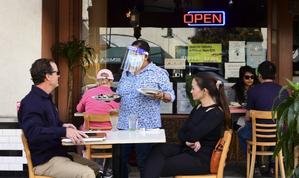 A waitress serves guests as people dine outdoors in Pasadena, California, the only city in Los Angeles County still allowing that service on December 2, 2020. Another round of coronavirus pandemic restrictions are mandated due to rising COVID-19 infection rates across Los Angeles County. (FREDERIC J. BROWN / AFP)
A waitress serves guests as people dine outdoors in Pasadena, California, the only city in Los Angeles County still allowing that service on December 2, 2020. Another round of coronavirus pandemic restrictions are mandated due to rising COVID-19 infection rates across Los Angeles County. (FREDERIC J. BROWN / AFP)
The country also recorded 195,121 new COVID-19 infections and thus the US has the highest number of both infections and deaths worldwide.
The number of US COVID-19 patients who are in US hospitals has reached 100,226, according to the COVID Tracking Project.
The number of inpatients jumped 9.6 percent to a record 96,668 on Dec 1 from 88,167 on Nov 23. California recorded a 38 percent surge over the eight-day period, with 8,171 coronavirus patients as of Tuesday. Arizona’s COVID-19 inpatients jumped 28 percent to 2,479. Coronavirus cases account for more than a fifth of hospitalized patients in North Dakota and South Dakota, Rhode Island, New Mexico, Indiana, Illinois, Minnesota and Michigan.
In Los Angeles, Mayor Eric Garcetti issued an order for residents to stay at home, warning that the city is approaching a “devastating tipping point” in its fight against COVID-19 that would overwhelm the hospital system.
“We must minimize contact with others as much as possible,” Garcetti wrote in the order dated Dec 2. The steps were needed to avoid risking “needless suffering and death,” he said.
The order, which supersedes one from June, prohibits public and private gatherings of people from more than one household and states that all businesses in the city that require people to work on location must stop operations. Walking, driving, travel on public transport, bikes, motorcycles and scooters are prohibited, other than for those undertaking essential activities.
Los Angeles County has the most infections of any county in the US, with 408,396 confirmed cases and 7,700 deaths.


